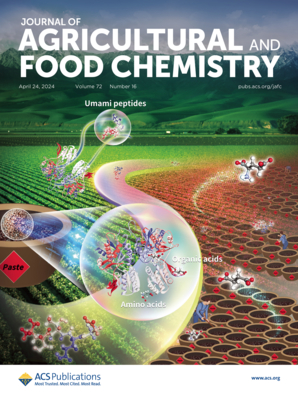Modifying Antifungal Peptides as Safe Food Preservatives.
IF 6.2
1区 农林科学
Q1 AGRICULTURE, MULTIDISCIPLINARY
引用次数: 0
Abstract
Food loss and waste (FLW) constitute a major global concern with significant environmental and economic ramifications. A major cause of FLW is fungal contamination, leading to food spoilage. Here, we investigate the use of antimicrobial peptides (AMPs) as a new source for food preservatives to combat filamentous fungi and yeast contamination. Specifically, we focused on two model AMPs, BP100 and P-113, and their derivatives that were designed and synthesized as antifungal agents for food preservation. BP100 and P-113 were modified in order to enhance their efficacy. BP100 was modified by substituting its N-terminal lysine with tryptophan (i.e., BP100 K1W) to extend its hydrophobic α-helical side, and P-113 was extended by synthesizing the original sequence triplicated (i.e., P-113 Triple). The modified peptides demonstrated strong antifungal and antibacterial activities. Importantly, they showed low cytotoxicity and were digestible, indicating their safety for consumption. BP100 K1W was particularly effective in a hummus food matrix model, successfully inhibiting Penicillium expansum's growth and consequently extending the food's shelf life. Thus, this highlights its potential as an effective food preservative and paving the way for future research into peptide-based food preservation strategies.改性抗真菌肽作为安全食品防腐剂。
粮食损失和浪费(FLW)是一个重大的全球问题,具有重大的环境和经济影响。FLW的一个主要原因是真菌污染,导致食物变质。在这里,我们研究了抗菌肽(AMPs)作为食品防腐剂的新来源,以对抗丝状真菌和酵母污染。具体而言,我们重点研究了设计和合成的两种抗真菌药物,BP100和P-113及其衍生物,作为食品保鲜的抗真菌剂。对BP100和P-113进行修饰,以提高其疗效。将BP100的n端赖氨酸替换为色氨酸(即BP100 K1W),延长其疏水α-螺旋侧,对P-113进行修饰,合成原序列三倍复制(即P-113 Triple)。该修饰肽具有较强的抗真菌和抗菌活性。重要的是,它们显示出低细胞毒性并且易于消化,这表明它们可以安全食用。BP100 K1W在鹰嘴豆泥食品基质模型中特别有效,成功地抑制了扩张青霉的生长,从而延长了食品的保质期。因此,这突出了它作为一种有效的食品防腐剂的潜力,并为未来研究基于肽的食品保鲜策略铺平了道路。
本文章由计算机程序翻译,如有差异,请以英文原文为准。
求助全文
约1分钟内获得全文
求助全文
来源期刊
CiteScore
9.90
自引率
8.20%
发文量
1375
审稿时长
2.3 months
期刊介绍:
The Journal of Agricultural and Food Chemistry publishes high-quality, cutting edge original research representing complete studies and research advances dealing with the chemistry and biochemistry of agriculture and food. The Journal also encourages papers with chemistry and/or biochemistry as a major component combined with biological/sensory/nutritional/toxicological evaluation related to agriculture and/or food.

 求助内容:
求助内容: 应助结果提醒方式:
应助结果提醒方式:


